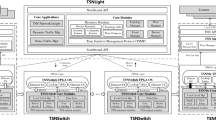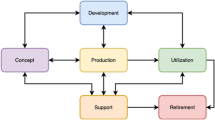Abstract
The correctness of hard real-time systems depends not only on the correct functional behavior but also on the correct temporal behavior. That is, the designed hard real-time system should meet all its functional and timing requirements even in the worst case. By performing timing analysis in early stages of the system life cycle, it is possible to reduce the overall development costs. This is due to the fact that the detection of the deadline violation in hard real-time systems will often lead to a complete redesign. Therefore the integration of system specification and timing analysis will be very helpful in the design of hard real-time systems. In this paper a method is proposed which supports both functional and timing verification of the specified system. The method integrates the extended specification and description language (SDL) and message sequence chart (MSC) specifications with the task allocation and schedulability analysis algorithms. The extensions of SDL and MSC are annotations in form of embedded comments in the original languages. They are used to describe the timing requirements of the specified system. The usability of the proposed method is illustrated through a case study.
Similar content being viewed by others
References
Alur, R., Holzmann, G. J., and Peled, D. 1996. An analyzer for message sequence charts. In T. Margaria and B. Steffen (eds.), Tools and Algorithms for the Construction and Analysis of the Systems. Springer Verlag, pp. 35-38.
Álvarez, J. M., Díaz, M., et al. 1999. An analyzable execution model for SDL for embedded real-time systems. In Proceedings of the Joint 24th IFAC/IFIP Workshop on Real Time Programming and the 3rd International Workshop on Active and Real-Time Database Systems, WRTP'99 and ARTDB'99. Saarland, Germany, pp. 117-122.
Ben-Abdallah, H., and Leue, S. 1997. Timing constrains in message sequence chart specifications. In Proceedings of the Tenth International Conference on Formal Description Techniques. FORTE/PSTV'97. Osaka, Japan.
Bucci, G., Fedeli, A., and Vicario, E. 2003. Specification and simulation of real time concurrent systems using standard SDL tools. In Proceedings of 11th International SDL Forum. Stuttgart, Germany, pp. 203-217.
Buetow, M., Mestern, M., Schapiro, C., and Krititzinger, P. S. 1996. Performance modeling with the formal specification language SDL. In Proceedings of the 9th International Conference on Formal Description Techniques. FORTE/PSTV'96, pp. 213-228.
ITU-T. 1997. ITU-T Supplement 1 to Recommendation Z.100: SDL + Methodology: Manual for the use of MSC and SDL (with ASN.1).
ITU-T. 1999a. ITU-T Recommendation Z.100: Specification and Description Language (SDL).
ITU-T. 1999b. ITU-T Recommendation Z.120: Message Sequence Chart (MSC).
Lambert, L. 1998. PMSC for performance evaluation. In Proceedings of the 1st Workshop on Performance and Time in SDL and MSC. Erlangen, Germany, pp. 70-77.
Liu, C. L., and Layland, J. W. 1973. Scheduling algorithms for multiprogramming in a hard real-time environment. ACM 20(1): 46-61.
Roddy, D. 1995. Satellite Communications, 2nd edn. New York, USA: McGraw-Hill.
Slomka, F., Zant, J., and Lambert, L. 1998. Schedulability analysis of heterogenous systems for performance message sequence chart. In Proceedings of the 6th International Workshop on Hardware/Software Codesign. Seattle, USA.
Telelogic Malmo, Sweden 1996. SDT 3.1 Reference Manual.
Verilog. 1996. Object GEODE-Technical Documentation.
Wang, S., and Faerber, G. 2000. A new algorithm to prove the schedulability of real-time systems. Control Engineering Practice 8: 689-695.
Wang, S., and Halang, W. A. 2001. A heuristic allocation method für multiprocessor systems. In Proceedings of IFAC Conference on New Technologies for Computer Control. Hong Kong, China, November 2001, pp. 283-288.
Zheng, T., and Khendek, F. 2002. An extension for MSC-2000 and its application. In: Proceedings of the Third International Workshop on SDL and MSC (SAM2002). Aberystwyth, UK, June 2002, pp. 221-232.
Zheng, T., and Khendek, F. 2003. Refining timed MSCs. In Proceedings of 11th International SDL Forum. Stuttgart, Germany. July, 2003, pp. 234-250.
Author information
Authors and Affiliations
Rights and permissions
About this article
Cite this article
Wang, S., Tsai, G. Specification and Timing Analysis of Real-Time Systems. Real-Time Systems 28, 69–90 (2004). https://doi.org/10.1023/B:TIME.0000033379.78994.1a
Issue Date:
DOI: https://doi.org/10.1023/B:TIME.0000033379.78994.1a




